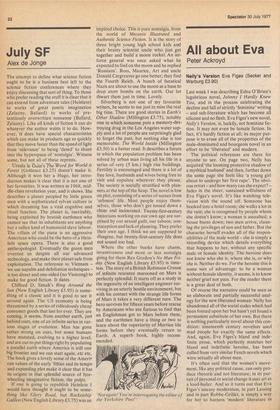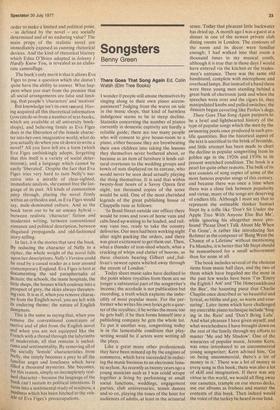All about Eva
Peter Ackroyd
Nelly's Version Eva Figes (Seeker and Warburg £3.90)
Last week I was describing Edna O'Brien's lugubrious novel, Johnny I Hardly Knew You, and in the process celebrating the decline and fall of strictly 'feminine' writing — and sub-literature which has become all silicone and no flesh. Eva Figes's new novel, Nelly's Version, is, luckily, not feminine fiction. It may not even be female fiction. In fact, it's hardly fiction at all; its major purpose is to erase all of the properties of the male-dominated and bourgeois novel in an effort to be 'liberated' and modern.
The political references are there for anyone to see. On page two, Nay has acquired 'the looming protective shadow of a mythical husband' and then, further down the same page she feels like 'a young girl about to undergo her first rape'. The obvious retort and how many can she expect? — fades in the sheer, sustained wilfulness of Eva Figes's novel. It's like watching television with the sound off. Someone has booked into a hotel room; she walks a lot in the rain; she is recognised by people whom she doesn't know; a woman is assaulted; a house burns down; two men arrive, claiming the privileges of son and father. But the character herself evades all of the responsibilities of the male world — she is simply a recording device which details everything that happens to her, without any specific male or female identity. The heroine does not know who she is, where she is, or why she is. Neither do we. For the heroine this is some sort of advantage: to be a woman without female identity, it seems, is to know neither grief nor pain. For the reader there is a great deal of both.
Of course the narrative could be seen as an elaborate and partially successful analogy for the new liberated woman: Nelly has abandoned all of the social codes which had been foisted upon her but hasn't yet found a permanent substitute of her own. But there is nothing particularly novel about this condition: nineteenth century novelists used mad people for exactly the same effects. And, again, Eva Figes's bland and indefinite prose, which perfectly matches her bland and indefinite heroine, has been culled from very similar Fench novels which were actually all about men.
It's often said that the women's movement, like any political cause, can only produce rhetoric and not literature; in its pursuit of personal or social change it uses art as a loud-hailer. And so it turns out that Eva Figes's uneasy modernism, in part Lessing and in part Robbe-Grillet, is simply a way for her to harness 'modern' literature in order to make a limited and political point. — as defined by the novel . — are socially determined and of no enduring value? The main props • of the realistic novel are immediately exposed as cunning rhetorical devices. And the kind of rhetorical blarney which Edna O'Brien adopted in Johnny 1 Hardly Knew You, is revealed as an elaborate camouflage.
The book's only merit is that it allows Eva Figes to pose a question which she doesn't quite have the ability to answer. What happens when you start from the premise that all social arrangements are false and limiting, that people's 'characters' and 'motives' But knowledge isn't its own reward. Having acquired all this theoretical information (you can do so from a number of text-books, which are available at all university bookshops), and believing firmly as Eva Figes does in the liberation of the female character into her own imaginative world, what do you actually do when you sit down to write a novel? All you have left are a form (which Eva Figes unthinkingly adopts, forgetting that this itself is a variety of social determinism), and a language which cannot be easily `liberated'. Despite the fact that Eva Figes tries very hard to turn Nelly's narrative into a miratle of clear-sighted, • immediate analysis, shecannot free the language of its past. All kinds of connotation peep through, placing the novel firmly within an orthodox and, as Eva Figes would say, male-dominated culture. And so the book turns out to be an uneasy hybrid — between realistic 'character' fiction and modernist writing, between conventional romance and political description, between disguised propaganda and old-fashioned story-telling.
In fact, it is the stories that save the book. By reducing the character of Nelly to a cipher, the whole weight of the novel falls Upon her descriptions. Nelly's Version could be read by a casual reader as a tour around contemporary England. Eva Figes is best at documenting the sad paraphernalia of Britain: the schools, the inane hospitals, the little shops, the houses which coalesce into a prospect of grey, the skies always threatening rain. It is as if, when you remove character from the English novel, you are left with Its enduring theme: the nature of English dampness.
This is the same as saying that, when you remove the conventional constraints of Motive and of plot from the English novel and when you are riot equipped like the French with a thread through the labyrinths ot modernism, all that remains is melodrama and sentimentality, By removing all of the socially 'female' characteristics from N elly, she simply becomes a prey to all the familiar angst and loneliness which have filled a thousand mysteries. She becomes, tor this reason, simply an incompletely realised character — because the language of the book can't sustain its political intentions. It turns into a sentimental study cif madness, a madness which has been hitched to the vehicle of Eva Figes's preoccupations.



































 Previous page
Previous page